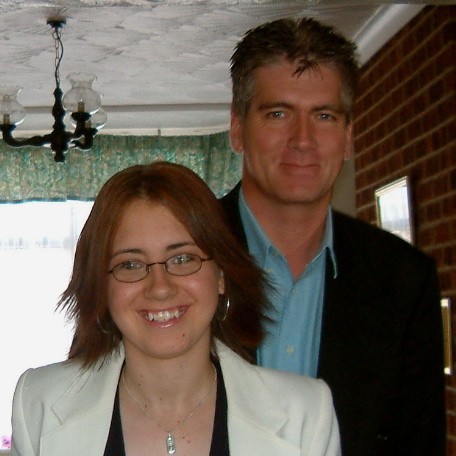Last year Ian Leech, who lost his student daughter to non-Hodgkin’s lymphoma, successfully campaigned for financial support for students whose treatment for illnesses such as cancer forced them to interrupt their studies. As a result of his work, young people no longer have to use student loans for support in such situations. In this guest post, he describes what happened – and why his campaign is far from over.
By Ian Leech
In 2007, having been diagnosed at the age of 20 with non-Hodgkin’s lymphoma, my daughter Melissa decided to suspend her university studies for a year to recover from this life changing illness and concentrate on getting well. It was a huge decision for Mel; she loved university and embraced all that university life had to offer (see this earlier post for Mel’s story).
The original prognosis was positive. Six rounds of chemotherapy three weeks apart, maybe some radiotherapy and it would, in the words of the consultant, just be a bad memory. It doesn’t take a mathematician to work out that treatment would last probably around 20 weeks. In that time Mel would endure extreme tiredness, confusion, have breathing difficulties, mouth ulcers and all that on top of the psychological aspect of being told that at 20 years of age, you have cancer.

Having made the decision to suspend her studies, she applied for financial support. She hadn’t drawn on her student loan and had no savings. The response from the government was that she should either suspend her studies or use her student loan.
I wrote to my MP explaining the psychological effects of her having to abandon her studies and explained that I was under the impression a student loan was to support study and not act as a health insurance.
So began a battle with first, the Labour government and latterly the Conservatives to bring about a change in the law. It was nearly six months before Melissa received any financial support. Three months later she sadly passed away. I wanted to ensure that any student suspending their studies to recover from long term illness would receive immediate financial support.
As more emails arrived from parents and students relating similar stories, I continued the fight after Mel’s death. Eventually, the government listened and on November 1st 2010 the deeming rule was changed. Students were no longer assumed to have drawn on their student loan when suspending their studies. Therefore they could now apply for Employment Support Allowance (ESA). Victory for the little man!
As usual though, the government officials making the decisions had not thought the change through and they failed to remove the long-standing clause that to qualify for ESA, a student must be in receipt of Disability Living Allowance. This meant that the majority of students, when suspending their studies to recover from a long term illness still would not receive any financial support.
It is incredible that in this day and age our government treat people in this way. Mel never wanted hundreds of pounds, just a few quid to enable her to buy a bar of chocolate or other every day items without having to ask mum and dad. She wanted just enough to give her a bit of self-respect during a horrible time.
In my last letter to the Department of Work and Pensions (DWP) I asked Sir Iain Duncan Smith how a student in Melissa’s position was supposed to live. The answer I received from the DWP was that people in Melissa’s situation are a minority and therefore they would do nothing more.
I wrote to David Cameron back in 2007 when he was in opposition. His reply, which I still have, stated that “the Conservative Party are committed to helping the most vulnerable in society”. How times change! Power really does change people!
My battle with the government continues. There are other avenues I am exploring to resolve this. Camping outside St. Paul’s Cathedral isn’t one of them, well, not yet! I still receive emails from parents and students who are experiencing similar problems. In order to receive DLA, you have to have had the condition for three months and it needs to be ongoing for a further six months.
One lady told me how her 20-year-old daughter, diagnosed with cancer, was told she wouldn’t receive DLA because her chemotherapy finished in four months and therefore her condition didn’t meet the six month criteria required for receiving it. It is unbelievable that those making decisions on financial support for seriously ill people think that a cancer patient’s illness ends when the last drop of chemotherapy goes through the veins.
The important matter in all of this is that when a student finds themselves in the position that Melissa did and decides to suspend their studies, they have access to financial support and they don’t have to wait nearly six months for financial support.
I recently received a letter from a lady who had been trying for nearly 12 months to get support for her daughter. Sadly, earlier this year the family were told her condition was incurable. The financial support quite rightly came flooding in, but as she said, “it’s a shame you have to be dying to get the help you needed in the beginning”.
I am all for getting rid of the cheats and scroungers that play the system, but whilst doing that, the government must not lose sight of why the welfare system was originally put in place, to look after those in need, or as David Cameron put it whilst leader of the opposition, in a letter to me in 2009, “to help the most vulnerable in society”
The fight goes on.
* You can read more about Ian’s work and campaigning on his website Mad4Mel. For information about lymphoma visit the Lymphoma Association website.
